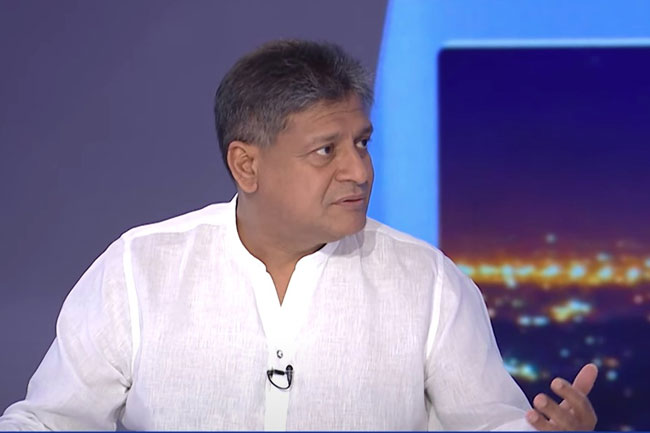‘Education qualifications alone won’t fix governance’ – Dilith calls for fresh perspectives in politics

State of the Nation (Special) | Episode – 46
The ‘Sarvajana Balaya’ Member of Parliament Dilith Jayaweera underscored the urgency for innovation, creativity, and strategic planning in terms of both governance and economic stability in order to provide pragmatic solutions to the country’s deep-rooted issues.
Joining Ada Derana’s current affairs programme “State of the Nation”, MP Jayaweera argued that while political leadership may change, the fundamental challenges of governance and national strategy remain constant.
He noted that the key to overcoming these challenges lies in fostering motivation, creativity, and a strategic vision that aligns with the nation’s long-term goals, while underscoring the importance of creativity in politics and decision-making.
Jayaweera began by acknowledging the educational background of many of the current Parliamentarians, particularly those who were elected with the promise of bringing a fresh perspective to the nation’s politics.
“It is the quality of the parliament that we should talk. This, as they call it historic, I don’t see it being very historic, other than the building being historic. It’s 169 MPs come from one single party. I have seen them, to be in the parliament. I see an issue.”
“They said to bring in the fresh faces to the parliament irrespective of their experience, but their main trust was the education. The doctors, the professors, the lawyers, the engineers, and they were promoting them always with their title – the engineer, the professor, the doctor during the campaign.”
However, Jayaweera argued that education alone does not guarantee effective governance. He remarked that while he, as a lawyer, might possess qualifications, it is his experience in business, management, and entrepreneurship that equips him with a different perspective on governance.
“Now I see them. Actually, I’m sure, all of them, in conventional sense, they’re educated. Though some of them, try to over claim their educational qualifications, more or less, they are educated. But this the point, parliament is not a place where you need so called educated people only. Either the basic thing of the democracy is that it’s a representation of the people. Whether they actually represent the ground, you know, the representation of the ground universally, it means something else.”
A critical issue, according to Jayaweera, is the tendency of politicians to view problems from conventional perspectives. He explained, “If you look at a problem from the same perspective as others, even 225 people in the parliament will not be able to offer different solutions.”
Jayaweera pointed out that despite the promise of change by the current government, many of the same excuses and rhetoric from previous parliaments are still being used. “The excuses we hear now are no different from the ones used in past parliaments. The rhetoric of ‘we can’t change things overnight’ and ‘we’re not magicians’ is what we’ve been hearing for years,” he noted.
The ‘Sarvajana Balaya’ Parliamentarian also lamented the lack of creativity and imagination among the current parliamentarians, particularly those who were touted as reformists. His expectations were high, given their academic credentials, but he expressed disappointment with the reality. “I thought that people like university professors and others in positions of power would bring fresh ideas. Instead, they lack imagination to this extent,” he said.
He further emphasized that without creative solutions, the country would continue to face the same challenges without making meaningful progress.
Citing Albert Einstein’s famous definition of insanity—”doing the same thing over and over again and expecting different results”—Jayaweera argued that the country cannot afford to keep repeating the same approaches to governance. “If we don’t think differently, we’ll be stuck in the same place, facing the same problems without any real solutions,” he warned.
He also highlighted the disconnect between the government’s promises and the practical realities of governance. For example, the current administration’s promises to reduce electricity bills by 30%, lower oil prices, and reduce VAT from 18% to 12% were ambitious but lacked clear financial planning and implementation strategies.
Jayaweera pointed out that these promises, while popular with the electorate, ignored the fundamental principle of managing a country’s finances. “In a business sense, you can’t promise cuts without knowing where the revenue will come from,” he explained, emphasizing the importance of a clear, practical financial plan in delivering on such promises.
Jayaweera reiterated the importance of creative leadership in overcoming Sri Lanka’s economic and social challenges. “We need to think differently if we are to move forward,” he asserted. “The problems we face—food security, energy, unemployment—are universal, but it is how we approach them that will determine if we succeed.”
He also raised concerns about the current government’s approach to dealing with issues like the rice shortage. The promise to not import rice, only to import it later, exemplified a lack of foresight and strategic planning.
“One promise that they gave us that they were not going to import rice. That’s I think among the promises that they gave, the worst and the silliest one is that because no government can say that. Because you don’t know for sure,” he added.
Furthermore, he went on to highlight the broader social consequences of ineffective governance, particularly the sense of hopelessness that is spreading among the people.
“As Sri Lankans lose faith in their leaders, they also lose their motivation to contribute to the nation’s progress. This erosion of hope affects all sectors—agriculture, construction, public service, healthcare, and beyond. A nation without hope and belief cannot progress,” Jayaweera argued, stressing that without addressing this widespread despair, no amount of policy change will make a difference.

